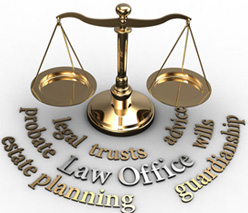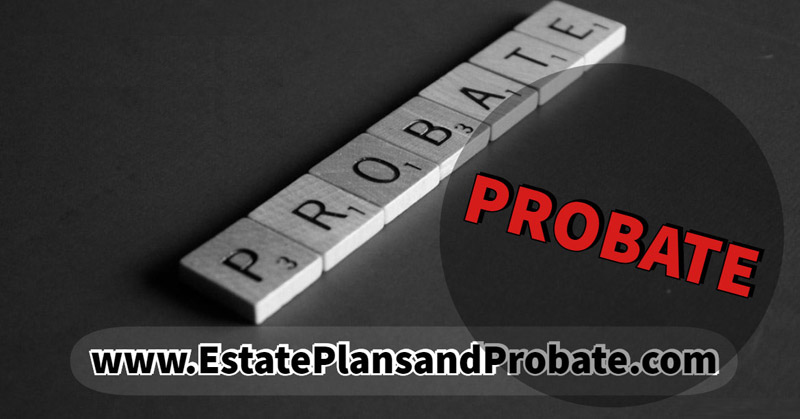
Practice Areas

Probate Law
Probate is the steps necessary to establish the validity of a Will. It's the process of collecting assets owned in the decedent's sole name, and distributing to his/her heirs or beneficiaries while keeping in mind the claims of creditors.

When people die, the decedent's estate frequently has to be "settled" and distributed. If Planning isn't done a large percentage of estates will pass through probate where the decedent's assets are gathered and identified, debts are paid and any remaining probate assets are distributed to the beneficiaries. Thus, Probate is necessary to collect a deceased's assets, pay taxes and debts, and distribute the decedent's assets to the correct beneficiaries. Although most assets in your estate may pass through the probate process, other assets may not. It often depends on the type of asset or how an asset is titled.
For example, many married couples own their residence jointly with rights of survivorship. Property owned in this manner bypasses probate entirely and passes by "operation of law." That is, at death, the property passes directly to the joint owner regardless of the terms of the Will and without going through probate. Other assets that may bypass probate include:
- Investments and bank accounts set up to pass automatically to a named person at death (payable on death "POD", transfer on death "TOD")
- Life insurance policies with a named beneficiary (someone other than the estate)
- Retirement plans with named beneficiary (i.e., IRAs, 401Ks, etc.)
- Other property owned jointly with rights of survivorship (i.e., real estate, etc.)
The Probate proceedings take place in the state where you were living at the time of your death. Owning property in more than one state can result in multiple probate proceedings. This is known as ancillary probate.
Probate is the official way that an estate gets settled under the supervision of the court. The probate process consists of determining the distribution of assets after someone's passing. More often than not, and individuals assets must pass through probate before getting to beneficiaries. The process can consist of, but is not limited to: Filing Petitions; Appointing Administrators; Identifying and Locating Assets; Notifying Creditors; Preparing Tax returns; Payment of Taxes (if applicable); Distributing Assets; and Closing the Estate.
In Florida, summary administration is a shorter, simpler probate proceeding (possibly 2-7 months) that maybe filed when the value of the entire estate subject to administration does not exceed $75,000, or that the decedent has been dead for more than 2 years.
A probate administration is the process by which a person is appointed to gather the assets of a person who has died (the "decedent"), pay the creditors of that person, determine the beneficiaries or heirs and distribute any remaining assets to the proper persons. This procedure subject to court supervision, normally involves the collection and safeguarding of assets. The payment of proper claims, the filing of inventories and tax returns and the settlement of tax liabilities, sale of assets as may be appropriate, accounting for all transactions and distributions of the estate. The process may take several months to several years, depending on a variety of circumstances and considerations.
Being named an executor by a family member or close friend is an expression of the highest regard and trust, and it is generally regarded as an honor. However, like many honors, it brings with it significant responsibilities and should not be taken lightly. The personal representative has the responsibility of managing the decedent's estate by: receiving all assets of the estate, control and protect the assets of the estate, investing assets while the estate is pending, determining and paying all lawful debts of the estate, making distribution to the proper beneficiaries under the Will, or intestate succession. Although the time and effort involved will vary with the size of the estate, even if you are the personal representative of a small estate, you will have important duties that must be performed properly or you may be liable to the estate or beneficiaries.
When a person settles a trust to transfer their assets upon their death, trust administration services are necessary for the proper distribution of the assets and/or identification of the potential tax issues which are present and require attention. In addition, during this process, we assist our clients regarding their rights and interests as beneficiaries, and recommend steps and/or actions necessary to help effectuate compliance with the appropriate laws governing the trust and if representing the fiduciary, to avoid personal liability for their actions, or inaction.
The probate process can be very complex and the overall process can be overwhelming and stressful after the loss of a loved one. When probate is required, Feldman Legal PA is experienced in probate administration and is here to help you and your family. If you are a personal representative and need estate or trust administration assistance, please feel free to contact our office.

Disclaimer
The hiring of a lawyer is an important decision that should not be based solely upon advertisements. Before you decide, ask us to send you free written information about our qualifications and experience. This website is designed for general information only. The receipt of information presented at this site should not be construed to be formal legal advice nor the formation of a lawyer/client relationship. Online readers should not act upon any information on this website without first seeking professional counsel. Some links within this website may lead to other sites. We do not necessarily endorse, sponsor or otherwise approve of any third-party content that may be accessed through this website. Contacting us does not create an attorney-client relationship. Please do not send any confidential information to us until such time as an attorney-client relationship has been established.
305-877-8070
info@estateplansandprobate.com